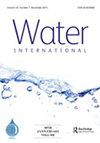可持续城市水治理的社会政治障碍:以哥伦比亚卡塔赫纳为例
IF 1.5
4区 环境科学与生态学
Q3 ENGINEERING, CIVIL
引用次数: 0
摘要
摘要社会政治因素影响着城市水不安全,但往往没有纳入城市水、环境卫生和个人卫生(WASH)规划。哥伦比亚卡塔赫纳市的WASH服务覆盖率表明水安全状况良好,但该市1991年至2019年的水政策和治理历史揭示了一个更为复杂的水不安全现实,而这并未反映在服务覆盖率指标中。本案例研究将科学调查与政策联系起来,展示了市政一级薄弱的机构和治理如何破坏地方水安全和国家可持续发展政策的实施。关键词:城市水安全wash政策可持续发展拉丁美洲和加勒比地区水治理领域哥伦比亚致谢作者感谢卡塔赫纳的利益相关者和社区成员,他们提供了当地的见解和信息。披露声明作者未报告潜在的利益冲突。联合国在可持续发展目标6中解决了水不安全问题:“确保人人享有水和卫生设施并对其进行可持续管理”(UN, 2015)。联合国水机制对水安全的定义是:“水安全是指人口为维持生计、人类福祉和社会经济发展,确保免受水传播污染和与水有关的灾害,以及在和平与政治稳定的气候下保护生态系统,而可持续地获得足够数量、质量可接受的水的能力。”(联合国水机制,Citation2013)。第94条要求从维根沼泽和迪克运河持续提供饮用水,以满足城市和区域的需要。第95条要求进行流域和环境管理,并确保清洁的饮用水(卡塔赫纳,Citation2001,第54页)。第95条要求进行流域和环境管理,并确保清洁的饮用水(卡塔赫纳,Citation2001,第54页)。不可缓解的高风险区域是指受到山体滑坡等自然灾害威胁的地区,被认为不适合居住(POT Cartagena, Citation2001, pp. 60-66)。本研究由美国国家科学基金会资助,资助号为BCS-1759972。本文章由计算机程序翻译,如有差异,请以英文原文为准。
Socio-political barriers to sustainable urban water governance: the case of Cartagena, Colombia
ABSTRACTSocio-political factors shape urban water insecurity, yet are often not incorporated into urban water, sanitation and hygiene (WASH) planning. WASH service coverage rates in Cartagena, Colombia, suggest high water security, yet the history of water policy and governance in the city from 1991 to 2019 reveals a more complex reality of water insecurity that is not reflected in service coverage indicators. This case study bridges scientific enquiry with policy to demonstrate how weak institutions and governance at municipal levels undermine local water security and the implementation of national sustainable development policy.KEYWORDS: Urban water securityWASH policysustainable developmentLatin America and Caribbeanwater governanceterritoryColombia AcknowledgementsThe authors thank the stakeholders and community members in Cartagena who provided local insights and information.Disclosure statementNo potential conflict of interest was reported by the authors.Notes1. The UN addresses water insecurity in SDG 6: ‘Ensure availability and sustainable management of water and sanitation for all’ (UN, 2015).2. As defined by UN-Water: ‘Water security is defined here as the capacity of a population to safeguard sustainable access to adequate quantities of acceptable quality water for sustaining livelihoods, human well-being, and socio-economic development, for ensuring protection against water-borne pollution and water-related disasters, and for preserving ecosystems in a climate of peace and political stability’ (UN-Water, Citation2013).3. Article 94 calls for sustainable availability of potable water from the Ciénaga de la Virgen marsh and Dique Canal for the needs of the city and region. Article 95 calls for watershed and environmental management and to assure clean water for potable use (POT Cartagena, Citation2001, p. 54).4. Article 95 calls for watershed and environmental management and to assure clean water for potable use (POT Cartagena, Citation2001, p. 54).5. An immitigable high-risk zone is an area under threat from natural disasters such as landslides and is deemed unsuitable for living (POT Cartagena, Citation2001, pp. 60–66).Additional informationFundingThis study was supported by the National Science Foundation, grant number BCS-1759972.
求助全文
通过发布文献求助,成功后即可免费获取论文全文。
去求助
来源期刊

Water International
工程技术-工程:土木
CiteScore
4.40
自引率
7.70%
发文量
58
审稿时长
6-12 weeks
期刊介绍:
Water International is the official journal of the International Water Resources Association (IWRA), founded in 1972 to serve as an international gateway to the people, ideas and networks that are critical to the sustainable management of water resources around the world. Water International''s articles, state-of-the-art reviews, technical notes and other matter are policy-relevant and aimed at communicating in-depth knowledge to a multidisciplinary and international community. Water International publishes both individual contributions and thematic special issues and sections on cutting edge issues.
All individual manuscript submissions are subject to initial appraisal and peer review by the Deputy Editor in Chief and the Associate Editors, and, if found suitable for further consideration, to peer review by at least one independent, anonymous expert referee. All external peer review is double blind. Thematic issues and sections are handled under comparable procedures by guest editors under the oversight of the Editor in Chief.
 求助内容:
求助内容: 应助结果提醒方式:
应助结果提醒方式:


